What’s a homeschool progress report in South Carolina? I’ve seen a variety of explanations. Most of them are busy-work without a meaningful purpose. Write out a formal report card with A in Reading, B in Math…and so on. Or just write out a little vague sentence or paragraph that everything is progressing just fine. Just to do it. But, why?
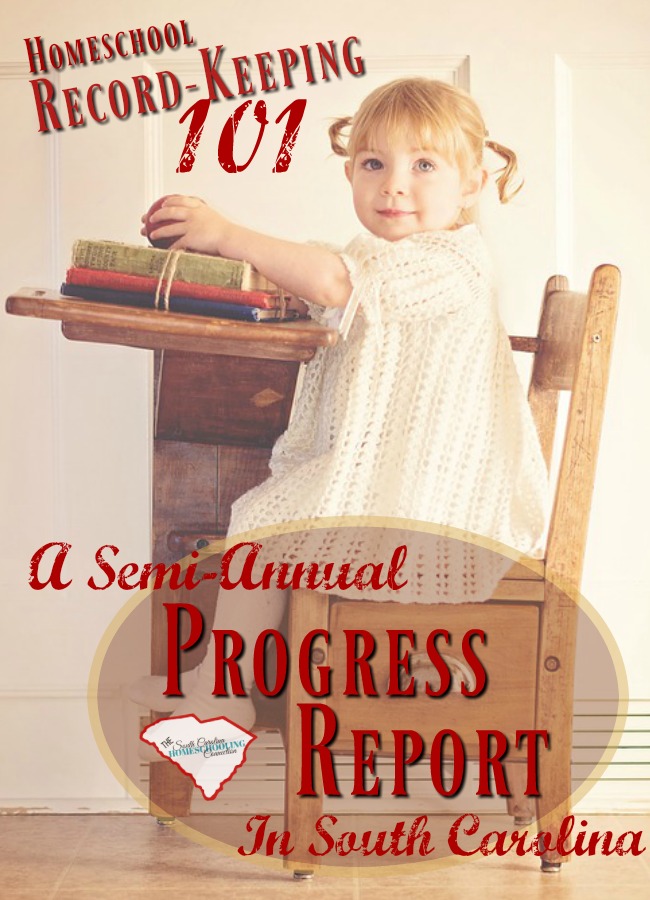
If we can understand why we’re doing a homeschool progress report, then it’s meaningful. The wording in the law says “semi-annual progress report”. It’s not necessarily a report card with A, B, Cs on it. Most public schools don’t use that grading system till after 3rd grade anyway. And I believe grades are not meaningful assessment for our purposes in homeschooling anyway.
The real reason why you’re maintaining your records is so you can see the student’s progress. It’s got to be meaningful to you in the way we naturally assess our life goals. Goal setting and self-assessment is a lifelong process.
I want to lose 10 pounds. (Okay, it’s more than 10 pounds…but let’s just set a reasonable goal and say 10). I have to work toward that goal so that I know when I have accomplished that, and then set new goals. I can look in the mirror every day or step on the scale. I can also take photos–noting my progress that I might not have realized otherwise.
That’s what you’re doing with your progress reports. You are taking note of progress that you might not have realized in the day-to-day.
The law says I should wear my seatbelt, but that’s not why I do it.
Here’s why I think we should keep homeschool records, not just because the law says to.
I think that it’s actually a very natural process that you are already probably doing in your homeschool, too. In December/January, we all take assessment of our lives and lifestyles–and set forth new year’s resolutions (or goals) that we would like to implement. It’s common for homeschoolers to kind of assess their progress thus far in the year and adjust (or scrap) their plans at this point.
What’s working? What isn’t working? What successes and achievements can you note? What areas need improvement? What areas do you need to spend more time or less time on?
Your assessment could be a list of objectives or goals that you set up. You can use the state standards or your curriculum to pick out some objectives. Or just review your journal/lesson plans to see what you’ve been working on. Go over some of the points you know the student mastered. Celebrate those accomplishments! Then, use this time to set some goals you’d like to work toward next.
You can also let the student have input on the assessments…what’s something you learned this year so far and what’s something you’d like to learn next? Maybe they want to learn to crochet or play the guitar, so you can work toward that goal.
For example:
- Math:
- Can count to 100 forwards and backwards
- Can skip count by 2’s, 3’s, 5’s and 10’s to 100 or 1000 or more.
- Needs to work on addition/subtraction facts
- Reading
- Is able to read independently (include a book list here)
- Vocabulary/comprehension: Correctly used the word telekinesis in a sentence last week
- Needs to work on context clues and inferred meanings.
- Writing
- Can copy a complete sentence or paragraph, knows to use indentation, capital letter and punctuation.
- Spelling patterns and vocabulary (list some)
- Can compose an original story–dictation to me or to a talk-t0-text device
- Science
- Can name the phases of the moon
- Can explain the lifecycle of a butterfly and a frog
- We need to find/buy a unit study on whales–that’s what he wants to study next
- Social Studies
- Knows how many electoral votes it takes to become president
- Can name the Continent, Country, State, County, and town/city that we live in.
- Let’s schedule a field trip to see a fire station
- Life Skills
- Can fold towels, put away
- Can set the table
- Needs to learn to put his shoes away instead of just kicking them off in front of the door every time
Include at least the five basic subjects outlined in the law. Add on other subjects like Art, Music, PE, Drama, Foreign Languages or Life Skills. But, make it meaningful to you, because the assessment is actually for you. Next time, you get the semi-annual progress report, you can look to see how much your student has accomplished…and celebrate those milestones.
Isn’t it funny how day by day nothing changes, but when you look back everything is different.
~C.S. Lewis
Need more information about what homeschool record-keeping requirements, click here
Check for sure what your accountability association requires. My association has a mid-year check sheet to just remind parents that they’re supposed to be keeping records and gives them a chance to say they need some help or clarification. But, they don’t turn in their records, it’s just a check-in. Some associations don’t have the mid-year paperwork check-point. Some associations do, plus they want a copy of a report card. Policies differ from one to another–beyond what the law requires.
The real reason why you’re maintaining your records is so you can see the student’s progress. It’s got to be meaningful to you in the way we naturally assess our goals and accomplishments throughout life. That’s what a semi-annual homeschool progress report is.
Record-keeping for high schoolers? Click here
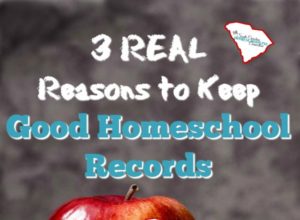

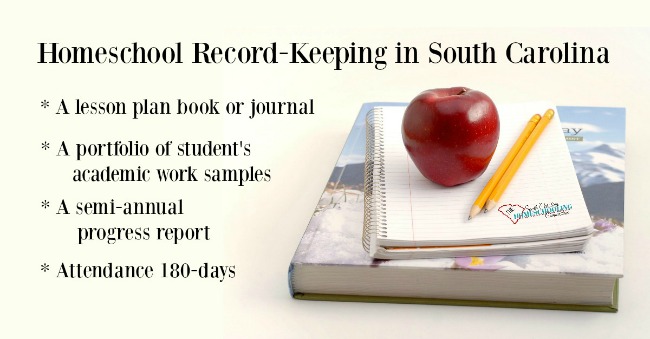

 2 Types of Boredom
2 Types of Boredom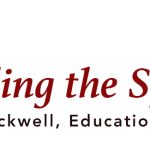 Special Needs Workshop
Special Needs Workshop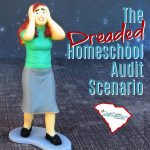 The Dreaded Homeschool Audit Scenario
The Dreaded Homeschool Audit Scenario Deschooling Activities
Deschooling Activities




[…] This is a check point to look back at what you’ve accomplished and set some goals toward what you might need to work on. I say, you should set some goals and let the kids set some goals of what they’d like to learn about, too. It’s easy to forget what you wanted to accomplish. The student wanted to learn crochet, but hasn’t yet. Do they still want to? Click here to read more about semi-annual progress report. […]